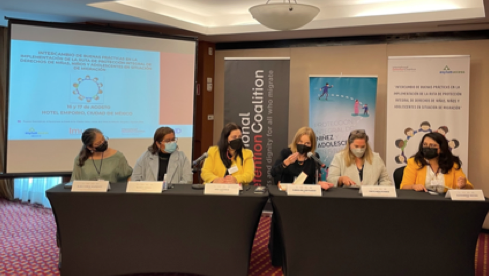In August 2022, International Detention Coalition, Asylum Access Mexico, Kids in Need of Defense (KIND), and the Institute for Women in Migration (IMUMI) hosted child protection authorities, migrant children, international agencies, and civil society organisations at an event in Mexico City aimed at reflecting on and exchanging ideas. Specifically, the event provided the opportunity to share successes and challenges in the implementation of the Migrant Child Protection Protocol,[1] as well as of laws that prohibit the detention of migrant children in the states of Veracruz, Tabasco, Chiapas, and Mexico City. It aimed to create a space for the exchange of promising practices and work experiences.
IDC and the other convening organisations have been working with the protection authorities of Veracruz, Tabasco, and Chiapas, as well as with civil society organisations, and public and private Centres for Social Aid in these states since 2021, in order to contribute to the implementation of laws that prohibit the detention of migrant children and to the adaptation of the Migrant Child Protection Protocol on a state level. Among other actions, we have attended directly to cases, strengthened the capacity of shelters and child protection authorities, and provided technical support for local protection systems to form protection commissions that adapt and implement the Migrant Child Protection Protocol on a local level.
Participants in the event shared their knowledge and experience on a variety of issues during two panel sessions and three working group sessions. Issues covered included the local implementation of the Child Protection Commission, or Working Groups, as well as practical tools for the protection of children, and Alternative Care Models.

In seeking to create a space for protection authorities and state Protection Systems to meet, discuss actions undertaken for the protection of migrant children, and build agreements for collaborative work, the following results were achieved:
- Progress in articulating municipal-state-federal level authorities to coordinate the attention to and protection of migrant children, including establishing dialogue and coordination mechanisms.
- Recognition of the technical support and accompaniment provided by civil society organisations to municipalities and states in the implementation of the Migrant Child Protection Protocol on a state level.
- Broadening knowledge on promising practices implemented by participants. The Tenosique Protection Attorney shared practices regarding the attention given to migrant children, while the Comitan Child Villages explained their model of alternative care and demonstrated the effectiveness of an open-door space.
The event was positively evaluated by participants, and the need was highlighted to create similar spaces in order to share the work of counterparts in other states, as well as of federal and state institutions, in addition to how to articulate joint action.
The organising group will continue to strengthen capacity and provide technical support for the implementation of the Protocol together with alternatives to detention to the Protection Systems of the three states involved in the project. A second event of this kind is planned for 2023.
[1] The Commission for the Integrated Protection of Migrant Children and People Seeking Asylum, within the framework of the National System for the Integral Protection of Children, agreed on the Migrant Child Protection Protocol in 2019. The objective of the Protocol is to guarantee the rights of migrant children through articulation and collaboration between institutions responsible for their protection, and by identifying responsibilities and agreeing on forms of coordination.
Written by Elizabeth Alvares IDC Americas Programme Support